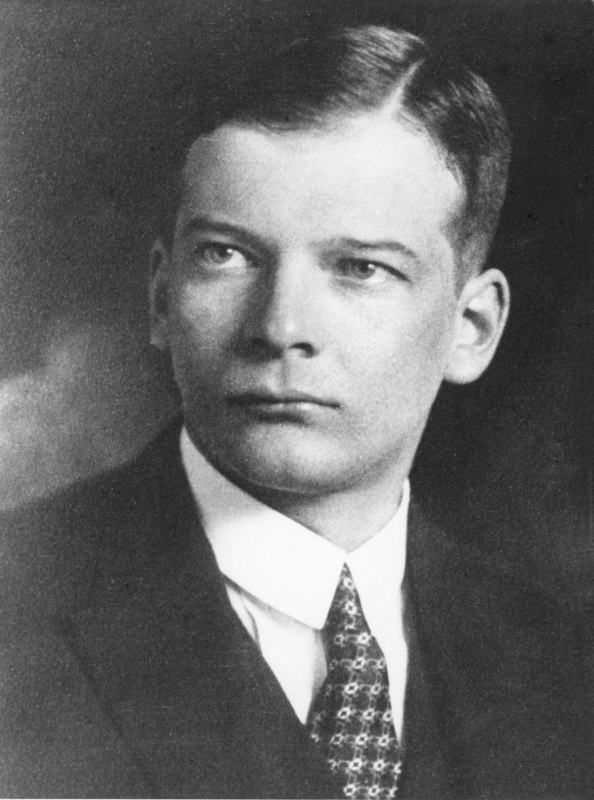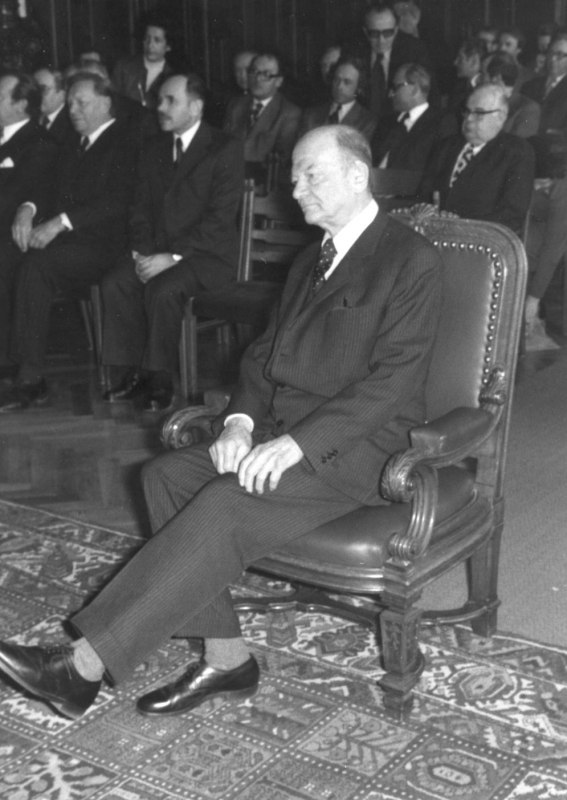Gottfried Haberler, Prof. DDr. Dr. h.c.
Honors
| Ehrung | Titel | Datierung | Fakultät | |
|---|---|---|---|---|
| Honorary Senator | sen.h.c. | 1975/76 |
Gottfried Haberler wurde am 28.01.1976 zum Ehrensenator ernannt als "IURIS ET RERUM POLITICARUM DOCTOREM, DOCTOREM HONORIS CAUSA SANGALLENSEM, PROFESSOREM OECONOMIAE UNIVERSITATIS HARVARDIANAE EMERITUM |
- Political Economy
- Statistics
- Faculty of Law and State
After graduating from secondary school in Vienna, Haberler began studying political science at the University of Vienna and obtained his doctorate in March 1923 with the dissertation “Dogmengeschichte der Wechselkurstheorien”. He then continued his studies and began working as a librarian at the chamber for commerce, trade and industry in Vienna in the summer of 1924. In November 1925 he also obtained his doctor of jurisprudence. As a post-doctoral student he studied at the Universities of London and Harvard from 1927 until 1929 and habilitated for political economy and statistics at the University of Vienna in 1928 with the paper “Der Sinn der Indexzahlen”. In 1929, he began acting as a legal counsel at the Chamber of Commerce in Vienna (until 1934), while meanwhile also holding lectures as a visiting lecturer at Harvard University (1931/32). Following this, he worked as an expert in the administration of the League of Nations in Geneva (1934-1936).
Haberler, who had become an associate professor in January 1934, emigrated to the United States in 1936, to take up a professorship for international trade at Harvard University. He continued his teaching at the University of Vienna to a moderate extent, until the National Socialists dismissed him from office in 1938. Haberler’s teaching license was “suspended until further notice” as of April 22nd, 1938. This was the result of his wife being considered a “Mischling 1. Grades” (“half-Jew”) according to the Nazi race doctrine. A further reason given in the protocol of a phone call between Arthur Marchet, the head of the Dozentenbund (National Socialist University Teachers’ League) of the University of Vienna, and a “Pg. Brückner”, was that Haberler spent “most of his time not in Vienna, but abroad, in Switzerland, America” and his teaching activities were thus compromised. Indeed no courses held by Haberler at the University of Vienna are documented for the winter semester of 1934, at least. A look at other people who were chased out because of “jüdische Versippung” (“mingling with Jews”) shows that his time abroad only played a marginal role - if any - in his dismissal. As the NSDAP-district committee I determined, Haberler was in any case not anymore registered in Vienna in October 1938.
In the USA a successful scientific and political career began for Haberler, who took out the American citizenship in 1943: He became chief consultant officer of price administration in 1941, advisor for the board of Governors of the Federal Reserve System in 1943, as well as vice president (1949) and then president (1962) of the American Econometric Society. Furthermore, he was a member of the International Economic Association, where he also was president in 1950/51 and honorary president beginning in 1953, as well as a member of the National Bureau of Economic Research in New York, where he became president in 1955. Haberler received honorary doctorates from the Universities of St. Gallen (1949), Saarland (1967), Innsbruck (1970) and the Vienna University of Economics (1980). He was made honorary senator by the University of Vienna on January 28th, 1976. After receiving emeritus status in Harvard in 1971, he was resident scholar at the American Enterprise Institute in Washington.
Haberler, who in the 1920s and 30s belonged to the circle around Ludwig von Mises, was known as a neoliberal conservative economist, addressing problems of business cycle theory and international trade. Even at the beginning of the 1960s he saw grave economic crises as a thing of the past, since a solid finance structure would prevent bank crashes. He also spoke out against the Club of Rome’s theory of zero and minus growth.
He saw the reason for inflation in the flawed economic policy of a state and not in “internal contradictions of capitalism”. In this regard, he opposed minimum wage laws as well as unemployment benefits and high social security benefits. According to Haberler, the problem of inflation could, however, also not be solved by freezing wages and prices, but with fiscal measures instead. He considered zero or almost-zero inflation to be ideal preconditions for economic growth. Haberler was substantially involved in the drafting of the International Monetary Fund’s program.
Among his most famous works are “Der internationale Handel” (1933), “Prosperity and Depression” (1937), “International Monetary Arrangements” (1964) and “The Problem of Stagflation” (1985).
Archiv der Universität Wien, Rechts- und Staatswissenschaftliche Fakultät, Personalakt 119 (Haberler). |
Archiv der Universität Wien, Vorlesungsverzeichnis Sommersemester 1934 bis Wintersemester 1937/38. |
Österreichisches Staatsarchiv/Allgemeines Verwaltungsarchiv, Personalakt Haberler. |
Österreichisches Staatsarchiv/Archiv der Republik, Gauakt Haberler.
Zuletzt aktualisiert am 04/04/22


